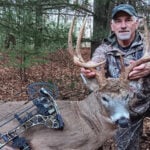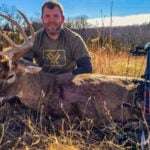Three deer trotted down an open hillside toward the woods’ edge, where I watched through yellowing aspen leaves still clinging to the branches around me I watched. Seconds later the lead deer, a yearling buck, flickered through the sumacs bordering the woods and headed toward the red oak that held me and my treestand.
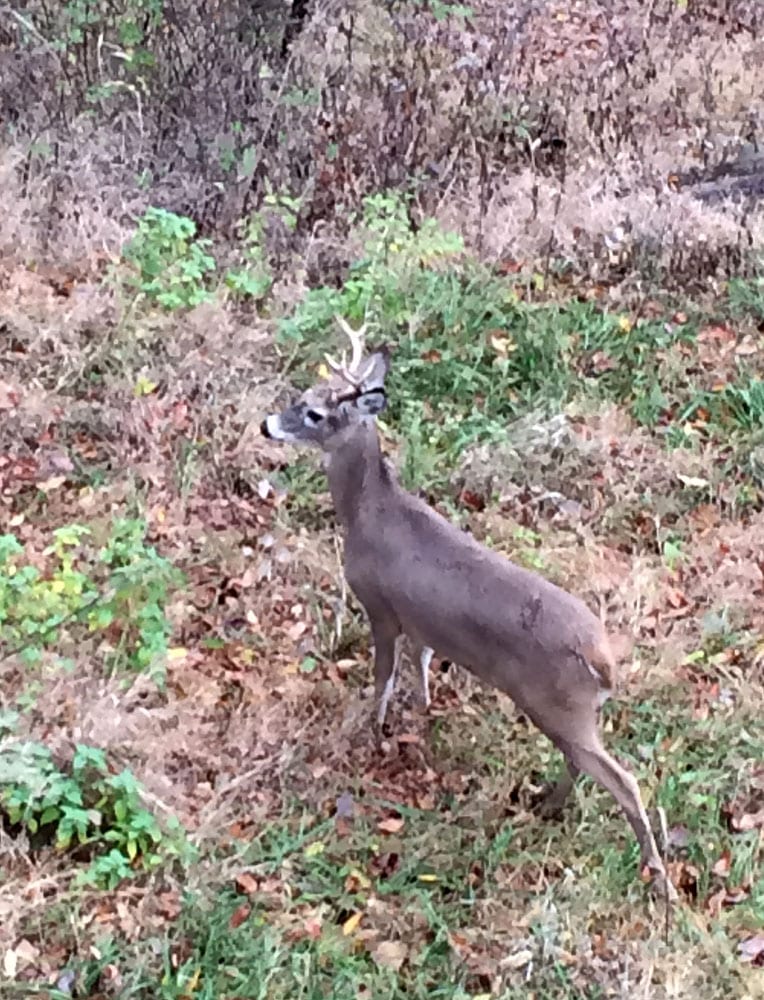
Deer learn quickly to always keep their guard up.
I wasn’t interested in shooting the 4-pointer, so I turned my attention to the other two deer, which were lingering in the sumacs. Moments later an adult doe walked into view, heading straight toward me. To her rear, another adult doe fed into view. With a bonus antlerless tag burning a hole in my pocket, I decided to try arrowing the first doe.
As the thought took hold, a jolt of predatory adrenaline raced through my system. At the same moment, the doe I was eyeing snapped to attention. She jerked up her head and stared at me. My mind raced. Had I twitched, moved my bow or cocked my head without realizing it? What caught her attention?
For about 30 seconds the doe stared at me, occasionally dropping her head as if to feed, and then jerking it back up. When that didn’t work, she jutted her head first to the right, then to the left, trying for different views. Unlike humans, deer have poor 3-D vision, so they often take several views to get a perspective on possible threats.
All told, she must have taken eight such “readings” in those 30 seconds before walking off stiff-legged, occasionally stopping and stamping the ground with a front hoof. When the doe got about 30 yards away and was still unsure about me, she looked over her shoulder a couple of more times, and then trotted away.
Once all three deer were gone, I kept wondering how the doe had suddenly picked me out. Maybe my silhouette was too obvious against the gray-dawn sky. Or maybe it was the deer’s sixth sense, which hunters often ascribe to whitetails. Could that doe have somehow sensed my predatory intent when I decided I wanted to shoot her?
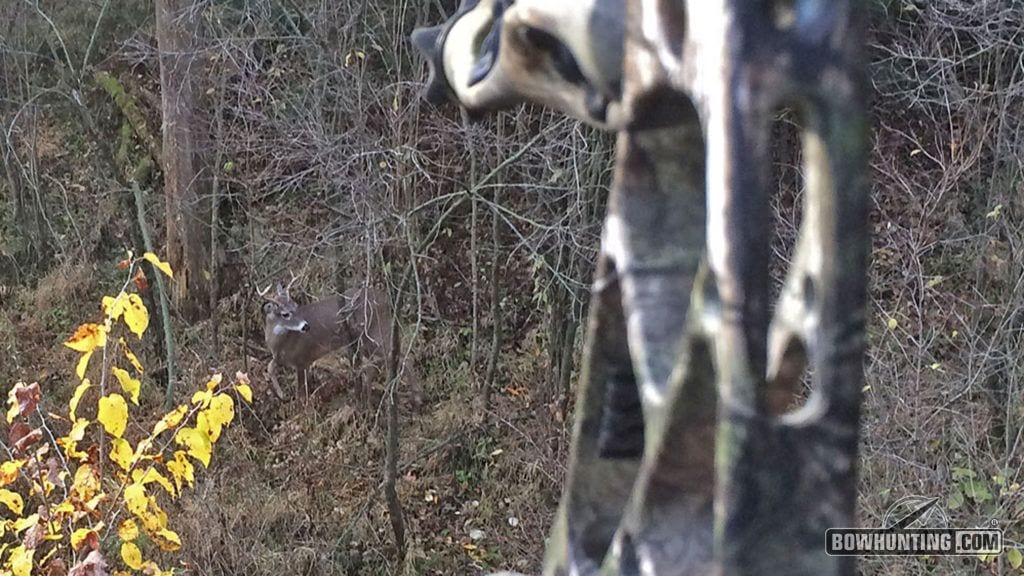
Can deer sense when hunters have no intention of shooting?
Don’t laugh. I’m not sure I believe deer can sense danger, but I know some deer hunters more skilled than me swear deer have that power. Besides, anyone who has a dog can attest how quickly Rover knows your mood without hearing your voice. And who hasn’t had a cold, prickly feeling on the back of their neck when something doesn’t seem right, or when you sense someone is watching?
But do deer and other prey animals get such sensations? That’s a question that will probably never be answered with authority. After all, we don’t even know how much extra sensory power humans have, so how can we prove or disprove such abilities in a nervous, jumpy critter like a whitetail that can’t share its thoughts with us?
A friend in Ontario, however, believes animals can sense intentions. Lil Anderson of Kenora is married to a deer hunting pal of mine, and when she goes deer hunting she has an incredible knack for getting close to
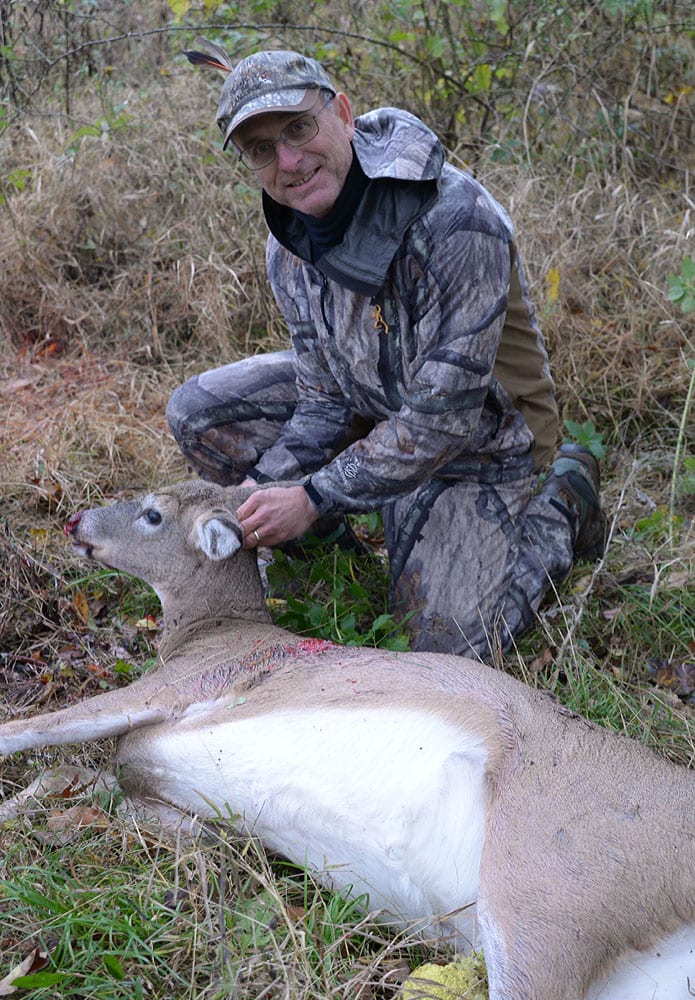
Whether deer have a sixth sense or not, sometimes none of their senses offer enough protection.
Can deer sense when hunters have no intention of shooting? deer. She’s been so close she can hear their stomachs growling, and she has pinpointed deer after hearing them sniff the air as they try to locate her.
Anderson thinks deer get close to her because they don’t always perceive her as a threat, even though she has killed some impressive bucks in her time. Besides her career with Ontario’s Ministry of Natural Resources, she also works as a wildlife rehabilitator. At any given time, Anderson is nursing bald eagles, geese, beavers, cub bears and fawns back to health. She says her “patients” instantly sense her mood when she approaches. If she’s tense, they respond in kind.
Anderson believes it’s possible deer don’t always get so close to me or her husband because they detect our intentions. I’m not sure I agree, and joke that it might just be that she smells nicer than we do, or maybe she doesn’t shake as much as I do from buck fever.
I guess we won’t settle this one today, but if you want to share your thoughts, you know how to reach me.
Let us know what you think. Do deer have a sixth sense? Comment below and let us know what you’ve experienced on your hunts.

 By
By 